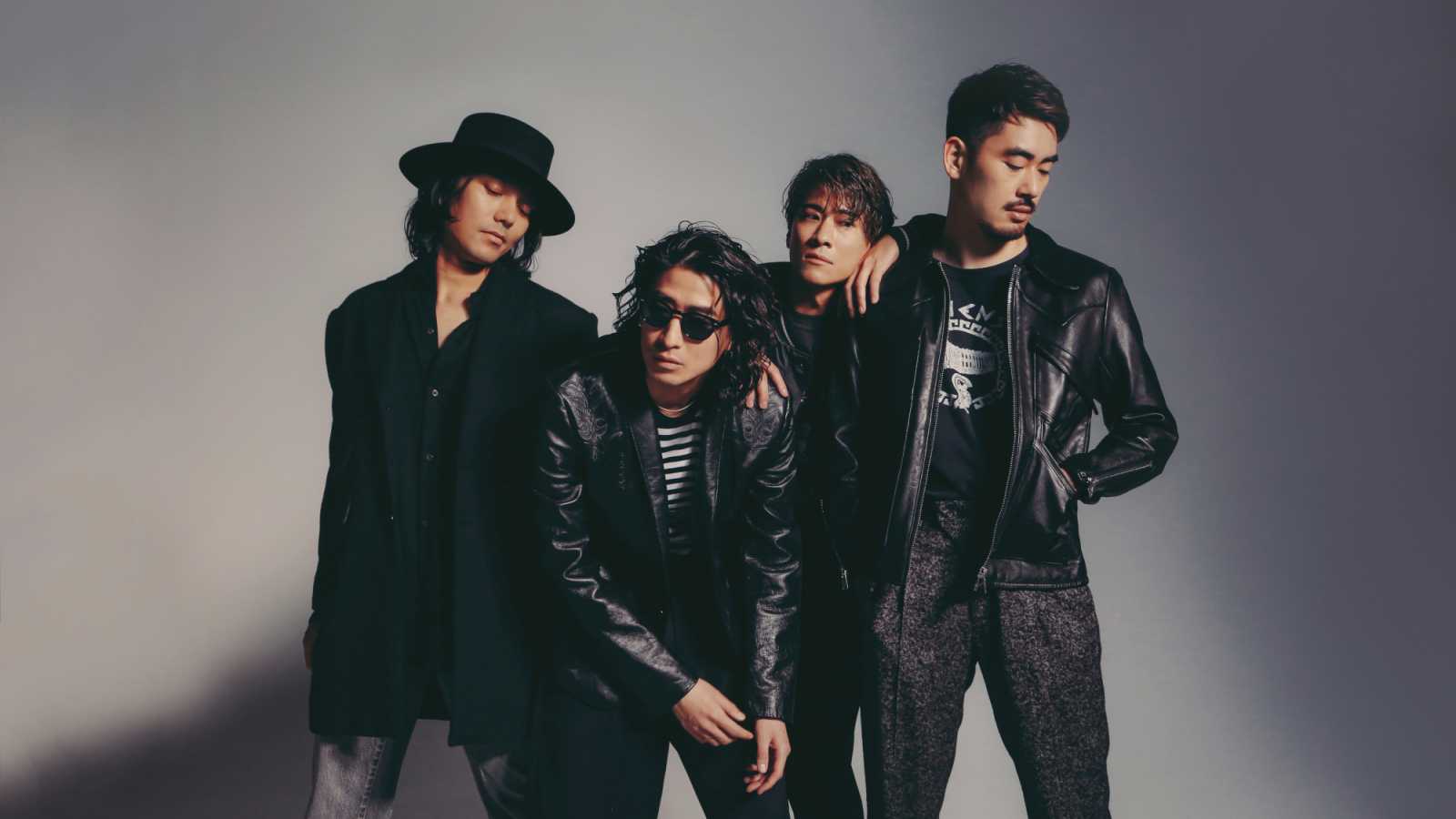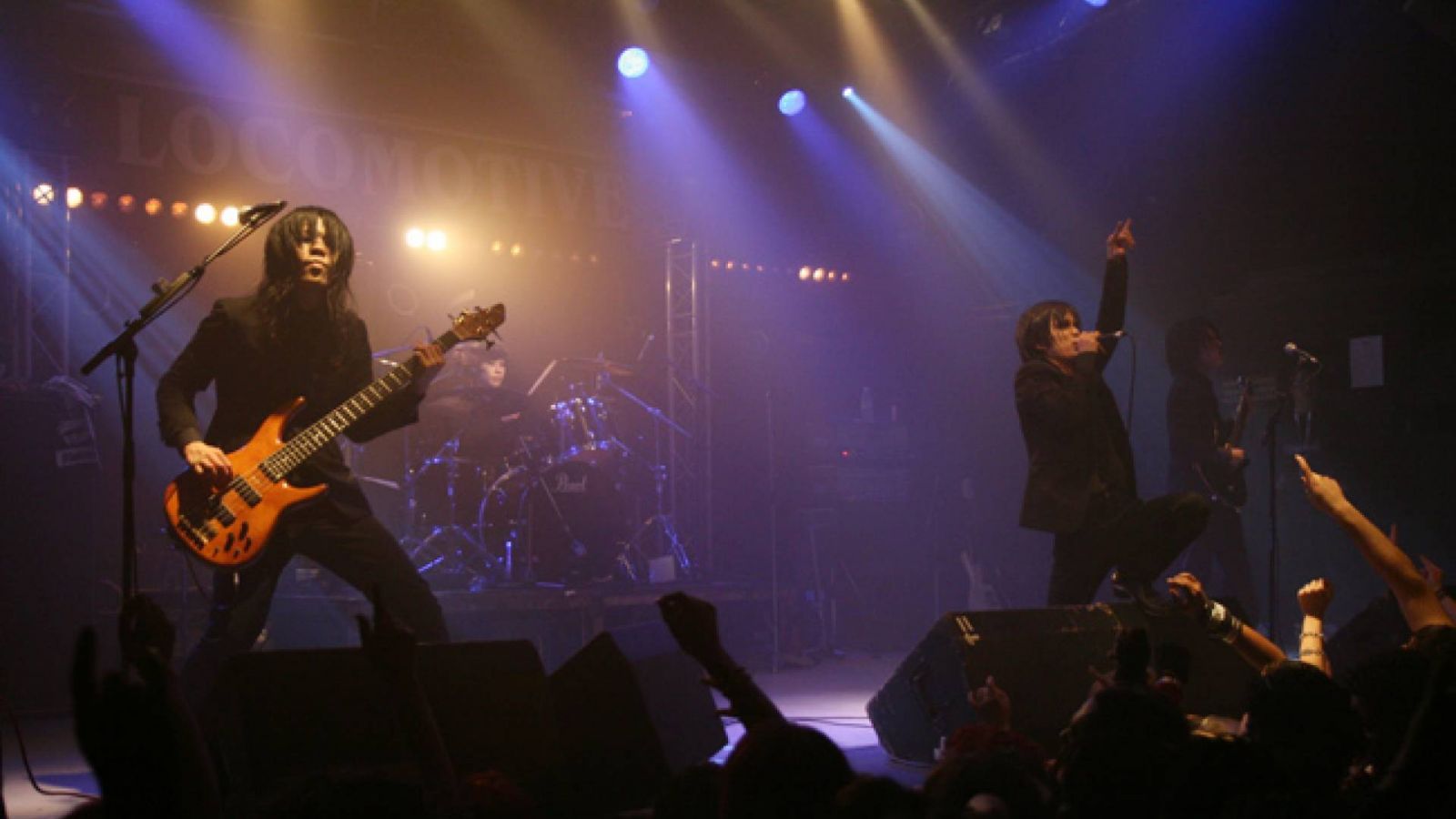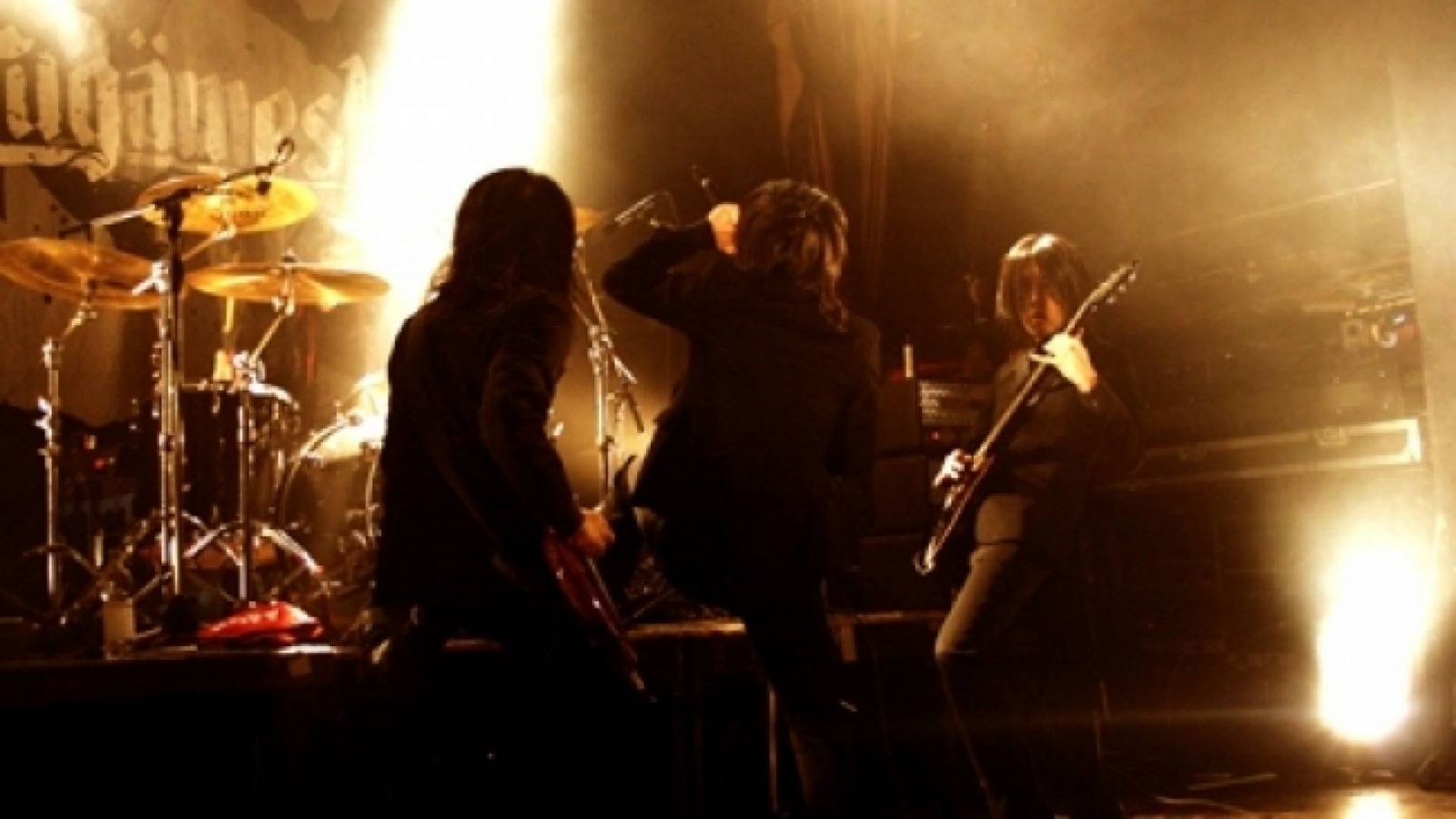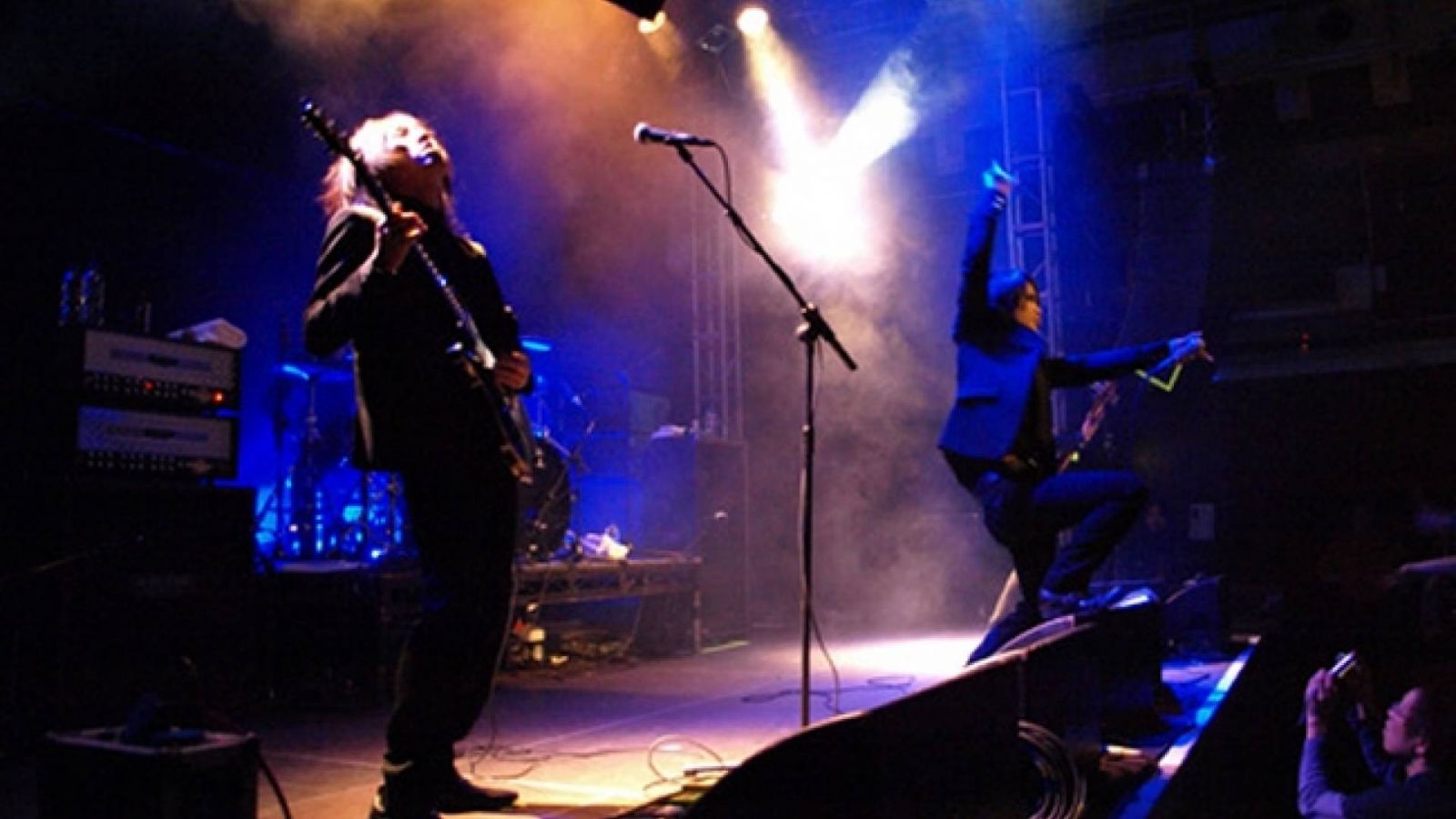girugamesh visited London for the first time in January and held a concert there. JaME took the opportunity to meet them before their gig in Islington.
As part of their tour in Europe, girugamesh visited England for the first time. Following the release of their self-titled album in both Japan and Europe, it was a fantastic time to interview the band and listen to their views on music, performing and their image.
Is this your first time or England or have you visited in the past for any reason? Is there anywhere in London that you have visited or would like to? Have you tried any of the cuisine yet?
Яyo: This is the first time that any of us have visited England and we haven't had the opportunity to visit anywhere yet, but we want to visit a noodle shop. We would like to go to Miso, it's quite close.
How are you finding the tour so far?
Shuu: So far the tour has been great, the Munich show was really exciting with so many people coming to see us. We were also pleased to find out that both our shows in Germany sold out, but in terms of reaction to our performance, the Paris show was the loudest. We hope that this tour will be a good bridge for the future.
What are your views on the representation of Japanese music? Do you feel that it is being made widely available enough in Europe?
Яyo: In our point of view, we feel that Japanese music is incredibly catchy and poppy, and while we don't think that it's being made widely available, I think that it's coming in the near future.
Your albums are available for download through iTunes, do you see this as new, positive way to download music?
Яyo: It's good for us in terms of promotion, in the way that it's easily affordable. We think that if you really like the band after the initial listen, you will buy the original CD.
Do you ever feel that you are merely seen as a "Japanese band?" If so, would you like to break out of that mold?
Яyo: So far we feel that we are categorized as being a visual kei band, but we would like to break out of this mold and small genre. Ultimately we would like to be recognized as an international band, like KoЯn. They're from the States, but are recognized worldwide.
Does the language barrier faze you at all, or are you strong believers that there is more to music than the spoken word?
Яyo: I believe that there is much more to music than the spoken word.
Do you find it easy to interact with Western fans? Are there any similarities between Japanese and Western fans?
Яyo: The only similarities between Japanese and Western fans really is the fact that they are our fans, but we strongly feel that the European fans have more power during our performances.
You've been to Europe on several occasions now, have you had to change anything about your performance for the Western fans?
Яyo: We take exactly the same approach as we do when we perform in Japan; there has never been any need for us to change our performance in different countries.
You have achieved relatively high popularity since your formation, does the situation faze you at all, or have you taken it in stride? What do you personally feel has aided you in gaining this popularity?
Яyo: It hasn't fazed us that much, and we feel that firstly it's our songwriting, the quality of our songwriting. Secondly, our strong will has helped us.
In more recent years, you have taken to wearing suits. Do you think this particular style has made you more recognizable to the public? Was this a conscious decision, or was it an experiment that you found you enjoyed?
Яyo: There is no other band who wears suits during their performances, so if you talk in particular about a "suits band," it has to be girugamesh. We made the conscious decision to wear the same suits and feel united as a band onstage.
Is the ongoing Western acceptance of Japanese culture, e.g. music, fashion, a good thing in your eyes? Is there anything about it that you would like to be done differently?
Яyo: We're glad that our culture is finally accepted in the world and we're satisfied with the way that things are going at the minute.
You played J-SHOCK in Germany last June, did you feel that the organizers displayed a varied representation of rock music for the event? How was the experience of performing in Europe for the first time?
Яyo: We don't really feel that the organizers displayed a representation of "rock music." We feel that it was more of a one-sided event, within the category of "Japanese Rock," there was Antic Café, who looks completely different from us. They have a "pop" image in comparison to our darker image, but still the three bands that performed alongside us were categorized as "rock music," so it wasn’t accurate in general.
You're performing at Wacken this year. What are your expectations for the festival? Does the number of people who attend Wacken intimidate you at all?
Яyo: We will be the only Japanese band performing at Wacken this year, so we would like to represent ourselves as a Japanese rock band and to show how capable we are as such a band. We would also like to prove ourselves, to show that we are worthy of international recognition and yes, the number of people have been mentioned to us, along with the people who lie around drunk!
Your mini-album Reason of crying saw the band maturing in sound, but did you see this process as natural, or was it more that in order to succeed you felt you had to?
Яyo: For us it was simply a natural process.
You feature mostly English titles on your newest album. Did you feel that English words fitted the mood of the songs better than Japanese?
Яyo: We would complete the song and when the lyrics were finished, we would just select some words from the song, and they happened to fit better than the Japanese.
Your self-titled album Girugamesh has a heavier, more distinctive metal atmosphere: how did inspiration for this progression come about, or was it merely a natural development?
Яyo: Following our tours in the past year or so, we felt that there was something missing in our songs, particularly after touring overseas. Therefore, we wanted to make our songs a little bit harder with an "edge," and we held that intention in mind.
You collaborated with Tatsuro and Mi-ya of MUCC on patchwork, how did this collaboration come about and what was it like to work alongside them?
Яyo: MUCC is under the same management company as us and Mi-ya was actually our sound producer for the album. He's always taken care of us very well and coupled with his experience, this was how our collaboration came about. The process was tough, but enjoyable for all of us.
Satoshi, your lyrics often discuss taboo subjects like war and hatred. What did you feel was your main inspiration this time around?
Satoshi: I wrote the lyrics during our tours and my main inspirations are from situations and human relationships around me.
Яyo, you composed the music for a vast majority of this album. What are your main inspirations when it comes to composing and what methods do you use?
Яyo: I don't really have any form of inspiration. I tend to sit around at home playing piano, guitar or programming some drum sequences, and sometimes inspiration just hits me.
You have kept the album length at a reasonably short length, is this for a harder hitting impact?
Яyo: Yes. We wanted to keep the songs short and simple and for me, I find personally if songs are 5 or 6 minutes long, straightforward and heavy, I get bored. I wanted to make the songs shorter and more efficient.
You have mentioned in previous interviews that you take inspiration from Western bands like Limp Bizkit, Slipknot and System of a Down. What it is about these artists that is so special to you?
Яyo: We admire these bands in particular because they are heavy and they use downtuning.
Nii, what inspired you to become a guitarist and who in particular has been a favorite over the years?
Nii: Guitar players are just cool. I like Wes Borland from Limp Bizkit.
ShuU, what equipment have you found suits you best when it comes to performing with the band?
ShuU: Reliable equipment is particularly important to me, as I sometimes throw my bass into the audience. I also feel that this type of equipment should be made readily available in stores all over the world.
For this album, did you discover any new artists that inspired you?
Яyo: For this album, we didn't find any artists that inspired us.
What are your ambitions for your next release?
Яyo: We're still in the process of recording right now, we don’t have anything particular in mind at the moment.
Lastly, do you have a message for your fans?
Яyo: We will record another great album in the future as well, so please support us.
---
JaME would like to thank girugamesh and Gan-Shin for giving us the opportunity for this interview.








